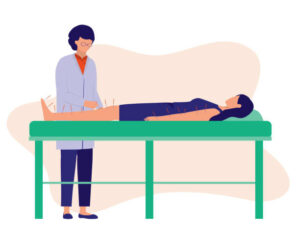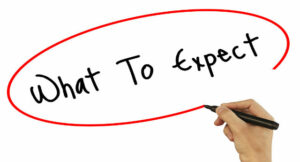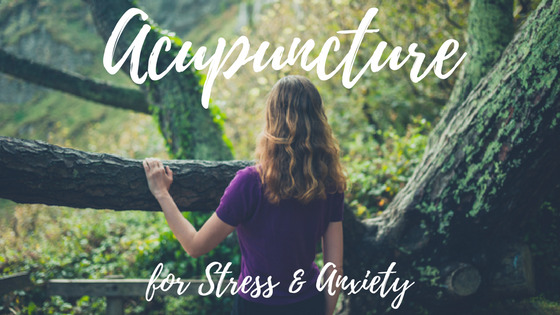Acupuncture is an ancient treatment that has been used for centuries to relieve all sorts of ailments. Recently, it has been gaining in popularity as a treatment for stress and anxiety. Acupuncture involves the use of needles that are inserted into specific points on the body. This helps to stimulate the flow of energy and promote healing. In this blog post, we will discuss the benefits of acupuncture for stress and anxiety, and how it can help you get relief from these conditions!
Contents
Defining Acupuncture for Stress and Anxiety
 With the state of the world today, it’s no wonder that so many people are suffering from stress and anxiety. These conditions can have a major impact on your life, making it difficult to function on a day-to-day basis. If you’re looking for an effective way to manage these conditions, acupuncture may be worth considering.
With the state of the world today, it’s no wonder that so many people are suffering from stress and anxiety. These conditions can have a major impact on your life, making it difficult to function on a day-to-day basis. If you’re looking for an effective way to manage these conditions, acupuncture may be worth considering.
Acupuncture is an ancient Chinese treatment that has been used for centuries to relieve a variety of ailments. It involves the use of thin needles that are inserted into specific points on the body. This helps to stimulate the flow of energy and promote healing.
There is a growing body of research that suggests acupuncture can be an effective treatment for stress and anxiety. One study found that acupuncture was able to significantly reduce anxiety levels in participants (Lee, Chen, & Chang, 2016). Another study found that acupuncture was effective in reducing stress and improving the quality of life for people suffering from cancer (Yuan et al., 2015).
It is important to note that acupuncture is not a fix or cure to make your stress or anxiety magically disappear. However, it can be a helpful tool to help you manage these conditions and improve your quality of life.
How Does It Work?
Acupuncture works by stimulating the nervous system and releasing chemicals in the brain that help to promote relaxation and reduce pain. It is believed that this helps to rebalance the body and mind, which can help to reduce stress and anxiety levels.
The use of needles may seem daunting, but the reality is that acupuncture is a relatively painless treatment. The needles used are very thin and are not inserted very deeply into the skin. Many people report feeling relaxed and even sleepy during their treatment.
The insertion of needles happens at strategic points and areas on the body that are known to be linked with stress and anxiety. The needles help to release tension and stimulate the flow of energy, which can promote relaxation. Some of the most common points used for stress and anxiety relief include the following:
- LI-11: This point is located on the inside of the elbow. It is known to help with headaches, eye strain, and neck pain.
- DU 20: This point is located on the top of the head. It is known to help with stress, anxiety, and insomnia.
- GB-21: This point is located on the shoulders, in the muscle area where the neck and shoulder meet. GB-21 is great for relieving tension headaches, neck pain, and upper back pain. It is also helpful in reducing stress and anxiety.
- GB-34: This point is located on the outer side of the leg, just below the knee. GB-34 is helpful in relieving stress, anxiety, and fatigue.
- SP-06: This point is located on the inside of the leg, just below the knee. It is known to help with stress, anxiety, and digestion issues.
- ST-36: This point is located on the outside of the leg, four fingers below the knee. It is known to help with fatigue, insomnia, and anxiety.
- LR-3: This point is located on the dorsum of the foot. It is known to help with stress, anxiety, and digestion issues.
These are just a few of the many points that can be used to help relieve stress and anxiety. Your acupuncturist will be able to determine which points are best for you based on your individual needs.
What To Expect?

If you decide to undergo acupuncture treatment for stress or anxiety, there are a few things you can expect. First, your acupuncturist will take a detailed medical history. They will want to know about your symptoms, stressors, and any other health concerns you may have. This will help them create a customized treatment plan for you.
- Before the session, you will be asked to remove any jewelry or clothing that may get in the way of the needles. You will then be asked to lie down on a comfortable treatment table.
- Your acupuncturist will then begin inserting needles into strategic points on your body. They may also use other techniques, such as cupping or moxibustion. These techniques are often used in conjunction with acupuncture to help improve the overall effectiveness of the treatment.
- Most acupuncture sessions last between 30 and 60 minutes. During this time, you will be asked to lie still and relax. You may feel a slight prick when the needles are inserted, but this should not be painful. You may feel a slight prick when the needles are inserted, but this is usually not painful. Once the needles are in place, you will be left to rest for 20-30 minutes. During this time, you may experience a sense of relaxation or even sleepiness.
- After your session, you will be asked to take it easy for the rest of the day. You may experience some soreness at the needle sites, but this is usually mild and should resolve within a day or two. It is important to drink plenty of water after your session to help flush out any toxins that may have been released during treatment.
If you’re considering acupuncture for stress or anxiety relief, it’s important to consult with a licensed practitioner. They will be able to assess your individual needs and determine the best course of treatment.
What Are The Benefits?
 Since acupuncture is an age-old treatment, there is a wealth of anecdotal evidence to support its efficacy. In recent years, however, there have been a number of studies that have shown acupuncture to be an effective treatment for stress and anxiety.
Since acupuncture is an age-old treatment, there is a wealth of anecdotal evidence to support its efficacy. In recent years, however, there have been a number of studies that have shown acupuncture to be an effective treatment for stress and anxiety.
- One study found that acupuncture was an effective treatment for generalized anxiety disorder (GAD). The study found that participants who underwent acupuncture experienced a decrease in anxiety symptoms. Furthermore, these effects were maintained over the course of a month.
- Another study found that acupuncture was an effective treatment for stress and anxiety in cancer patients. The study found that participants who underwent acupuncture experienced a decrease in anxiety and an improvement in quality of life.
- A number of other studies have also shown acupuncture to be an effective treatment for stress and anxiety. This evidence suggests that acupuncture may be a safe and effective treatment for these conditions.
The benefits include the following:
- Reduced stress
- Improved anxiety
- Improved quality of life
- Safe and effective
If you are struggling with stress or anxiety, acupuncture may be a treatment worth considering. Consult with a licensed practitioner to see if it is right for you.
Are There Any Drawbacks?
Although it is largely considered to be a safe treatment, there are a few potential drawbacks to acupuncture.
- First, it is important to consult with a licensed practitioner. There have been cases of people sustaining injuries from acupuncture due to the use of unsterilized needles or the insertion of needles into the wrong areas.
- Second, acupuncture may not be covered by your health insurance. Be sure to check with your insurance provider before scheduling an appointment.
- Third, acupuncture may not be suitable for everyone. If you have a bleeding disorder or are pregnant, you should consult with your doctor before undergoing treatment.
- Lastly, some people may experience minor side effects from acupuncture, such as bruising or soreness at the needle sites. These side effects are usually mild and resolve within a few days.
Acupuncture is generally considered to be a safe and effective treatment for stress and anxiety. However, it is important to weigh all the potential risks and benefits before deciding if it is right for you. Consult with a licensed practitioner to see if it is right for you and your condition.
What Are Some Alternative Options?
If acupuncture is something that you’re not interested in, there are a number of other options that you can explore.
- Aromatherapy: Aromatherapy is the use of essential oils to promote relaxation. It works by stimulating the senses and promoting a sense of well-being.
- Progressive Muscle Relaxation: Progressive muscle relaxation is a technique that involves tensing and relaxing different muscle groups in the body.
- Acupressure: Acupressure is a form of massage that uses pressure points in the body. It works by stimulating the body’s natural healing process.
- Massage therapy: Massage therapy is a form of bodywork that uses various techniques to promote relaxation.
- Meditation: Meditation is a practice that involves focusing on the breath and clearing the mind of thoughts. It is often used to promote relaxation and stress relief.
- Yoga: Yoga is a form of exercise that combines physical postures, breathing techniques, and meditation. It can help to improve your mental and physical well-being.
- Exercise: Exercise releases endorphins, which have mood-boosting effects.
- Talk therapy: Talk therapy can help you to identify and manage the stressors in your life.
There are a number of options that you can explore if acupuncture is not right for you. Consult with your doctor or a licensed practitioner to find out what would be best for you and your condition.
Conclusion
From the above, we can conclude that acupuncture for stress and anxiety is an effective and safe treatment option with a number of benefits. However, it is important to consult with a licensed practitioner to ensure that it is the right treatment for you. There are a number of alternative options available if acupuncture is not right for you. Be sure to explore all your options before making a final decision.
If you or someone you know is looking for psychological help, Therapy Mantra is here for you. We are the leading providers of online therapy and counseling. Our team of highly trained and experienced therapists can provide assistance at the most affordable rates. Contact us today to learn more about our services. You may also visit our website to book an online therapy session or download our free Android or iOS app for more information.


